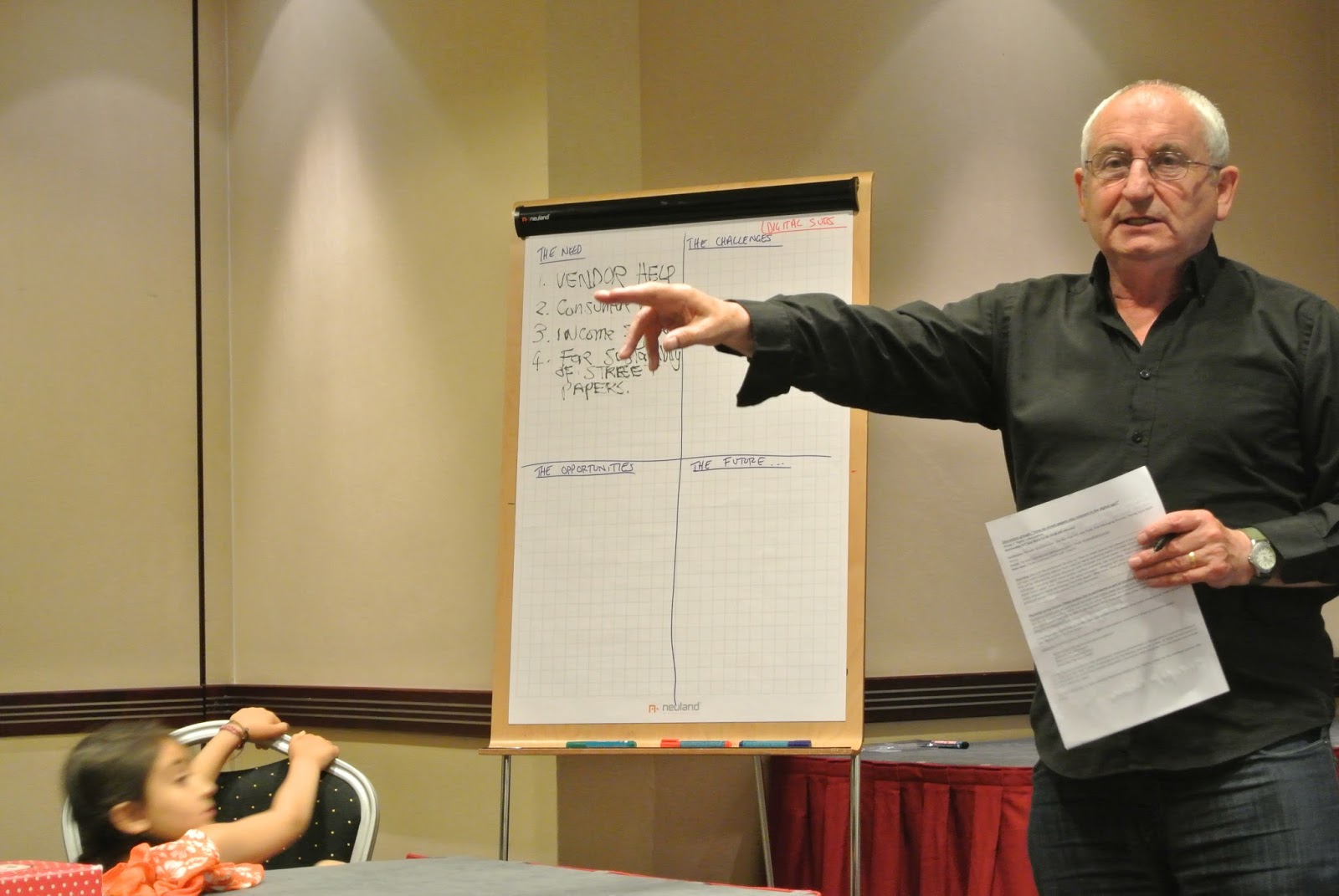Delegates were split into five groups to tackle various challenges and opportunities that are emerging from the rapid advancement of digital technology and to discuss its effect on the media landscape. They were asked to keep in mind the questions: What are the needs this technology/approach addresses? What are the related challenges and opportunities? What does the future hold for street papers?
Group 1 focused on the topic of digital subscriptions. Street sales are a priority to all street papers as they are the main source of income for vendors, however the opportunities are plenty when discussing the future use of the web.
 |
| John Bird (Big Issue UK) |
Since the demand for digital subscriptions seems to be underestimated in many places, there are many opportunities: tokens could be sold on the streets and vendors who either can't or do not want to sell on the streets could get an alternative chance to interact with the readers. The sky is the limit when the street papers enter the digital era and John Bird emphasized that "innovation is a bit like justice - it doesn't exist unless it can be seen being done".
 |
| Christian Lissman (BI in the North) and Steven Persson (BI Australia) |
In particular they looked at the INSP digital street paper pilot. In partnership with The Big Issue in the North, customers could get a digital copy of the popular street paper on their phone by buying a QR code card from a vendor, priced equally to the print copy so that the vendor’s income is still assured. This has since been replicated by The Big Issue Australia.
The discussion participants discussed its success and possible improvements. "A digital copy is a first step, but it's not the future," Ilse Weiss from Strassenkreuzer said.
+119.jpg) |
| Alan Attwood (BI Australia) and Fay Selvan (BI in the North). |
Fay Selvan explained: "For me the experiment with the cards was very important, because it told us: if we're selling a digital version, it has to offer much more than a simple PDF copy of the print."
Birgit Müller (Hinz&Kunzt, Germany) wants to explore the cross-media opportunities an e-paper has to offer. In her opinion the digital version has to be completely different: "We could be very unique in our electronic media. We should highlight the opportunities of digitalisation rather than shouting 'Oh, we are all dying!'"
 |
| The participants discussed the advantages and disadvantages of a digital street paper. |
Group 3 focused on the possibilities of cashless payments. With credit and debit cards being widely accepted, an increasing number of people, especially younger, potential buyers, no longer carry cash, costing vendors valuable business. Discussion leaders Amy Roe (Editor of Real Change, USA) and Brittany Langmeyer (Publisher at StreetWise, USA) looked at a pilot scheme launched by Chicago-based street paper StreetWise, in partnership with digital payment experts at PayPal, which involved customers being able to pay for the magazine by smartphone.
Other possibilities to pay without cash are via text messages (the price for the street paper is charged by your telephone company and appears on your bill) or via NFC (Near Field Communication): you pay for a product by putting your smartphone equipped with a special chip in close proximity to a reader. However, there are some challenges for electronic payment: the vendor's willingness to learn about new technologies, the fees Apple and Google charge for apps in their app stores, the fact that many vendors prefer to get their money instantly - which is not always guaranteed with cashless payment - and, last but not least, the limited battery life of smartphones.
+discussion+grop+3+003.jpg) |
| Amy Roe (Real Change) and Brittany Langmeyer (StreetWise) lead through the discussion group"cashless payment". |
Erlend D. Paxal, Manager of the paper Sorgenfri from Norway, highlighted a crucial aspect: "All those systems we talk about right now are quite complicated to use, both for the vendor and the customer. What we really need are payment options which are as easy to use as cash or even easier - otherwise we will deter customers from buying our papers".
Group 4 discussions centred on digital marketing, and the benefits that an effective social media campaign can bring. Aaron Israelson (Editor-in-Chief of Faktum, Sweden), Patricia Merkin (Director of Hecho en BsAs, Argentina) and Maree Aldam (Development Manager at INSP) looked at how street papers can reach new readers and increase sustainability at minimum cost with the use of social media and other digital marketing tools.
Swedish street paper Faktum demonstrated this in 2012 with the launch of Faktum Hotels, a website where people can ‘book’ rooms in a homeless hotel – ‘amenities’ include filthy mattresses and flattened cardboard boxes – with their booking money being donated to the paper. The campaign received widespread coverage in Sweden and around the world, increasing both the magazine’s profile and awareness about homelessness, a perfect example of how social media can be used in powerful and innovative ways.
At the end of the day's discussion session delegates from each group reported back to the conference at a feedback session, allowing other groups to hear the main points covered in each topic.































.jpg)


